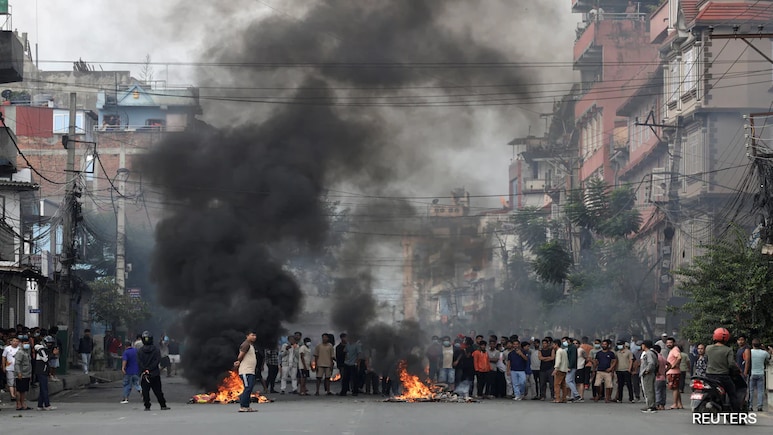
Nepal on Tuesday witnessed widespread protests, with people demanding the resignation of Prime Minister KP Sharma Oli over the corruption charges, a day after 19 people died in violent protests triggered by a social media ban.
Hours after the ban on 26 platforms was lifted, thousands of students and youngsters staged a protest outside Parliament, demanding government accountability. Clashes escalated when some entered the complex, and police responded with water cannons, tear gas, and live rounds.
Protests erupted in major cities, including Kathmandu, Pokhara, Butwal, and Bharatpur. At least 19 people have died, with over 300 others sustaining injuries. Home Minister Ramesh Lekhak resigned after the violence.
India's neighbours have faced major political unrest in recent years, with protests and uprisings challenging their governments.
Bangladesh
In August 2024, Bangladesh experienced a massive political upheaval when Prime Minister Sheikh Hasina resigned following mass protests.
The protests were fuelled by allegations of corruption and authoritarian governance. An interim government, led by Nobel Laureate Muhammad Yunus, was established, but the political landscape remained volatile.
Myanmar
Myanmar's internal conflict has intensified, particularly in the Chin State, leading to a significant refugee crisis. Since the military coup in 2021, over 65,000 refugees, predominantly from the ethnic Chin community, have fled to neighbouring India. Mizoram has been a primary destination, with thousands seeking refuge, Reuters reported. The influx has strained local resources and heightened ethnic tensions in the region.
Afghanistan
The Afghan conflict began in 2001 when the US-led NATO forces intervened following the 9/11 attacks to remove the Taliban from power and target al-Qaeda. The war continued for two decades until August 2021, when US and allied troops withdrew from the country. Following the withdrawal, the Taliban quickly regained control of Afghanistan and the government in Kabul.
Clashes continue in some areas due to the ongoing conflict between the Taliban, ISIS-K, and anti-Taliban Republican insurgents. As of now, the Islamic Republic of Afghanistan, which collapsed during the Taliban takeover, remains the internationally recognised government.
Sri Lanka
Sri Lanka remains in the throes of an economic crisis that began in 2022. It was marked by shortages of fuel, food, and medicine, and soaring inflation. Mass protests, known as Aragalaya, forced President Gotabaya Rajapaksa and Prime Minister Mahinda Rajapaksa to resign.
Ranil Wickremesinghe assumed the presidency but faced continued dissent. The 2024 elections brought Anura Kumara Dissanayake and the National People's Power coalition to power.
Maldives
The Maldives' political landscape shifted after Mohamed Muizzu won the presidential election in November 2023, defeating incumbent Ibrahim Mohamed Solih. He campaigned on nationalist pledges, including an "India out" stance, and sidelined former president Abdullah Yameen, who formed a new party, the People's National Front.
Mr Muizzu's policies, including closer ties with China, have strained relations with India. Domestically, his government is more conservative than its predecessor. In July, Prime Minister Narendra Modi visited the Maldives, agreeing to a $565 million credit line.
Pakistan
Pakistan continues to face deep political instability and security challenges. The 2022-2024 unrest, triggered by the ouster of former Prime Minister Imran Khan via a no-confidence vote, saw nationwide protests, rallies, provincial assembly dissolutions, and a failed assassination attempt on Khan in November 2022.
Groups like the Tehreek-e-Taliban Pakistan (TTP) have intensified attacks in northwest Pakistan and Balochistan, often using drones and roadside bombs, while the Afghan Taliban sanctuary complicates counterterrorism efforts. Separatist groups like the Baloch Liberation Army (BLA) also pose threats.
Pakistan's economic crisis, high inflation, unemployment, dwindling reserves, IMF dependence, and climate-related disasters such as deadly floods have fuelled unrest. Restrictions on media and anti-state online content, along with deportations of undocumented Afghans, have led to further tensions.
Track Latest News Live on NDTV.com and get news updates from India and around the world

